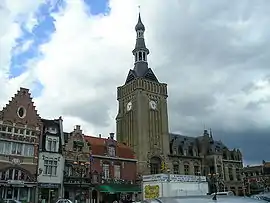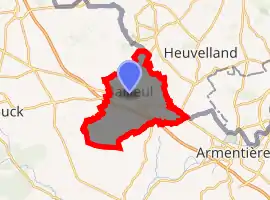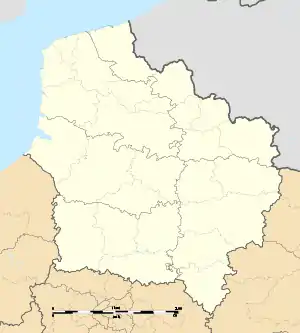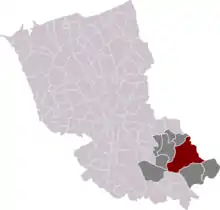Bailleul, Nord
Bailleul (Belle in Dutch) is a commune in the Nord department in northern France. It is located in French Flanders, 3 km (2 mi) from the Belgian border and 26 km (16 mi) northwest of Lille.
Bailleul
Belle | |
|---|---|
 Market place and belfry of Bailleul | |
_Nord-France.svg.png.webp) Coat of arms | |
Location of Bailleul 
| |
 Bailleul  Bailleul | |
| Coordinates: 50°44′21″N 2°44′00″E | |
| Country | France |
| Region | Hauts-de-France |
| Department | Nord |
| Arrondissement | Dunkerque |
| Canton | Bailleul |
| Intercommunality | Communauté de communes de Flandre Intérieure |
| Government | |
| • Mayor (2014-2020) | Marc Deneuche |
| Area 1 | 43.42 km2 (16.76 sq mi) |
| Population (2017-01-01)[1] | 14,769 |
| • Density | 340/km2 (880/sq mi) |
| Time zone | UTC+01:00 (CET) |
| • Summer (DST) | UTC+02:00 (CEST) |
| INSEE/Postal code | 59043 /59270 |
| Elevation | 14–86 m (46–282 ft) (avg. 44 m or 144 ft) |
| 1 French Land Register data, which excludes lakes, ponds, glaciers > 1 km2 (0.386 sq mi or 247 acres) and river estuaries. | |

Population
| Year | Pop. | ±% |
|---|---|---|
| 1793 | 11,576 | — |
| 1800 | 8,944 | −22.7% |
| 1806 | 9,222 | +3.1% |
| 1821 | 9,475 | +2.7% |
| 1831 | 9,823 | +3.7% |
| 1836 | 9,911 | +0.9% |
| 1841 | 9,923 | +0.1% |
| 1846 | 10,141 | +2.2% |
| 1851 | 10,078 | −0.6% |
| 1856 | 10,108 | +0.3% |
| 1861 | 10,102 | −0.1% |
| 1866 | 12,896 | +27.7% |
| 1872 | 12,828 | −0.5% |
| 1876 | 12,968 | +1.1% |
| 1881 | 12,712 | −2.0% |
| 1886 | 13,335 | +4.9% |
| 1891 | 13,276 | −0.4% |
| 1896 | 13,449 | +1.3% |
| 1901 | 13,530 | +0.6% |
| 1906 | 13,573 | +0.3% |
| 1911 | 13,251 | −2.4% |
| 1921 | 6,651 | −49.8% |
| 1926 | 8,545 | +28.5% |
| 1931 | 9,691 | +13.4% |
| 1936 | 10,928 | +12.8% |
| 1946 | 11,352 | +3.9% |
| 1954 | 11,964 | +5.4% |
| 1962 | 12,583 | +5.2% |
| 1968 | 13,077 | +3.9% |
| 1975 | 13,474 | +3.0% |
| 1982 | 13,400 | −0.5% |
| 1990 | 13,847 | +3.3% |
| 1999 | 14,146 | +2.2% |
| 2006 | 13,616 | −3.7% |
| 2009 | 13,989 | +2.7% |
| 2011 | 14,517 | +3.8% |
| 2015 | 14,337 | −1.2% |
Politics
Presidential Elections 2nd Round
| Election | Winning Candidate | Party | % | |
|---|---|---|---|---|
| 2017 | Emmanuel Macron | En Marche! | 56.30 | |
| 2012 | François Hollande | PS | 50.87 | |
| 2007 | Nicolas Sarkozy | UMP | 51.52 | |
| 2002 | Jacques Chirac | RPR | 82.44 | |
Media
Bailleul is the birthplace of French filmmaker Bruno Dumont and served as the setting for his first two feature films. This area is also a setting in the Timothy Findley book The Wars.
Carnival
The inhabitants of Bailleul celebrate carnival with five days of processions and other festivities. The carnival has taken place since 1853, when the Philanthropic Company of Bailleul was founded. During the event, a search takes place for the needy ones of the city. The Gargantua Giant chairs the festivities, seated on his float and accompanied by his kitchen boys.
At the end of Shrove Tuesday, after the final procession of around 50 floats, with local groups, brass bands and plenty of confetti, Doctor Francisco Piccolissimo tries to cure the excesses of some inhabitants in an unconventional way in front of the town hall, and the festival continues late into the night in the town's cafés and bars.
Points of interest
Railways
Bailleul has a railway station on the line from Lille to Calais and Dunkirk.
International relations
Personalities
- Edmond de Coussemaker
- Pharaon de Winter, painter
- Marguerite Yourcenar, academic
- Jean Delobel, politician
- Michel Delebarre, politician
- Bruno Dumont, director and filmmaker
- Philippe Édouard Léon Van Tieghem, Biologist and botanist born in Bailleul in 1839
- Jean-Luc Samyn, jockey in American thoroughbred racing
References
- Sources
- Notes
- "Populations légales 2017". INSEE. Retrieved 6 January 2020.
- "Résultats France - Présidentielle 2017 - 1er et 2nd tour". lemonde.fr. Retrieved 2017-09-06.
- "Jumelages". ville-bailleul.fr (in French). Bailleul. Retrieved 2019-11-21.
| Wikimedia Commons has media related to Bailleul (Nord). |
.svg.png.webp)